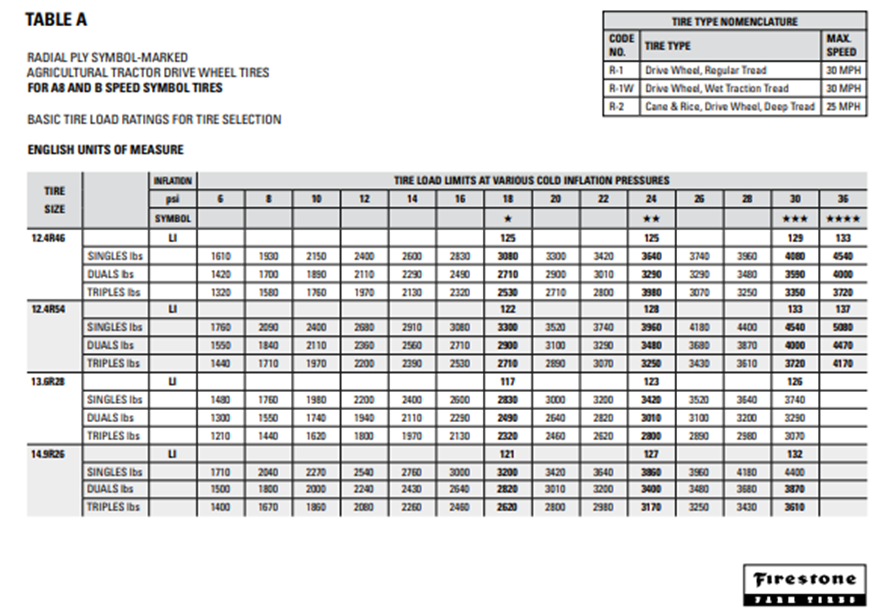Beginner’s Guide To Tractor Tire Inflation: Manage PSI For Better ROI
May 19, 2023
Tires

When you want to maximize the return on investment (ROI) of your farming equipment, the first step is to look for opportunities to improve tractive efficiency, which is a standard measure of how well tractors use available engine power to pull implements through the soil.
And as any experienced farmer or tractor tire expert will tell you, the best way to improve tractive efficiency is to keep your tractor tires properly inflated.
In fact, according to research by California Agriculture, underinflated tractor tires are the leading cause of poor tractive performance, leading to:
- Up to 20-40% reduction in engine power and increased rolling resistance (e.g. a 210 hp tractor with underinflated tires can only put 115hp to work!)
- Increased soil compaction and 5.7% lower crop productivity in controlled tests
- Greater risk of “power hops,” also called “wheel-hops,” “tire hops,” and “tractor hops,” a bouncing that occurs in four-wheel drive and mechanical front-wheel drive tractors when the tire sidewall flexes and recoils.
- Decreased fuel efficiency, with underinflated tires using 20% more diesel fuel than their properly inflated counterparts.
But what is “proper” tractor tire inflation, exactly? With so many different types of equipment working in different field conditions, there is no single answer for every application, but your local TIRECRAFT tech can help determine what’s best for your operation.
Read on to learn more and discover the dos and don’ts of tractor tire inflation, or contact your local TIRECRAFT to schedule a free consultation with a tractor tire specialist near you.
How Much Should I Inflate My Tractor Tires?
Ask 10 farmers what tractor tire pressure is correct, and you’ll likely get 10 different answers. This should come as no great surprise—after all, every field is different, and the load, weight, and ballasting vary widely from one tractor to the next.
For these reasons, tractor tire experts always recommend consulting the manufacturers’ guidelines, or using an official tractor tire inflation calculator, like this one provided by Firestone:

Alternatively, you can simply ask your local TIRECRAFT techs. It’s 100% free, and a quick consultation could save you a lot of time and money.
Manage Tractor Tire PSI To Boost ROI: Contact TIRECRAFT
Once you’ve determined the best tractor tire pressure, it’s time to put that knowledge to work.
For best results, we recommend you:
- DO check air pressure often—daily checks are best, but weekly checks should suffice.
- DON’T overinflate—overinflation decreases tractive efficiency, ride quality, tread life, and fuel efficiency.
- DO use a calibrated pressure gauge—if possible, invest in a set of two to avoid the risks of improper readings
- DON’T underinflated—underinflation can seriously damage your tires, leading to costly replacements and downtime.
- DO visually inspect your tires for wear and abnormalities during every check and top-up—the sooner you spot these warning signs, the easier they’ll be to fix!
- DON’T measure air pressure when your tractor tires are “hot”—make sure they have not been used for a few hours to avoid inaccurate readings.
If you’d rather leave it to the pros, or you need to find a great price on a portable gauge and compressor, get in touch with your local TIRECRAFT for a free quote.
References
Lancas, K., Upadhyaya, S., Sime, M., & Shafii, S. (1996). Overinflated tractor tires waste fuel, reduce productivity. California Agriculture, 50(2), 28-31.
Back

